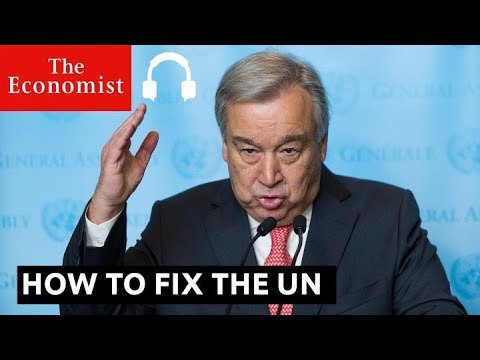
As the United Nations turns 75 years old, the world order it established has never been under greater strain. On “The Economist Asks” podcast, Antonio Guterres, the UN secretary-general, explains how—and why—international cooperation needs to be fixed.
00:31 – Mr Guterres, the UN turns 75 at a moment of multiple crises and new challenges. You’ve said yourself that these are “dark days”. How would you define the biggest challenges?
01:51 – If we take your first point that they look at the relationship between three major powers is dysfunctional. This is hardly new for the United Nations. What makes this different from… if you take the broad sweep of 75 years of the United Nations. How has this changed?
02:57 – How much more difficult is it made by the fact that America has stepped back to some extent from the world? We already saw this under President Obama “nation building at home”, but now we see this even more with Donald Trump, who is, for example, pulling America out of the the World Health Organisation. Can the UN function properly engaged America?
03:41 – But you are very careful in how you treat President Donald Trump. For example, you may be critical of American policy. You’ve never criticised him by name. Is that a deliberate strategy?
04:11 – And what about the other major powers? First of all, China, you’ve been criticised for not speaking up loudly enough on human rights, for example, with China. How how do you handle this question with China having a very different view of human rights
05:04 – And let’s not forget Russia. it’s asserting itself more or more. And its vetoing many U.N. Security Council resolutions. How do you how do you handle the somewhat disruptive behaviour of Russia and how do you get towards a Security Council that can actually agree on things?
06:04 – Russia has brazenly grabbed a piece of Ukraine. China has occupied disputed territories in the South China Sea. These are exactly the kind of areas where we would expect the Security Council to be active. Has it become too slow and is it not being challenged enough to do the job it’s there to do?
07:38 – I suppose I wondered whether, in your view, the UN was pivoting towards judging itself by its successes in terms of humanitarian relief, refugee crises and the other things that it does in that sphere. World Health Organisation, et cetera. And less about security
09:10 – Could I talk about the relationship between China and Russia, which seems in some ways to restored a kind of character that harks back to the Cold War in many respects. And I’m wondering what you think the implications of that are. You are diplomatically saying It’s obviously good if you get more cooperation between the major players, but in some ways, it’s not so good if two of the major world powers who have anti-democratic views or leanings are buddying up together
10:32 – Can I turn to the future of the U.N. here we are, 75. The institutions are really quite long in the tooth. They should they should rightly have some reform to modernise them. But is reform impossible, given these divisions at the top?
11:43 – Are you hearing things in this great exercise that to some some extent surprise you and make you think that the U.N. needs to change course in some ways?
12:16 – again, back to the grand sweep of history, what do you see the next period of the UN heralding? We’ve got to. Seventy five years. Take us forward to 100 years
Further reading:
See all of The Economist’s podcasts here:
Read our full special report about the United Nations here:
America and China’s rivalry has become outright hostility during the pandemic:
Read more about how world leaders ignore China’s human rights abuses:
Listen to an episode of our podcast “Checks and Balance”: is America right to surrender global leadership?
source